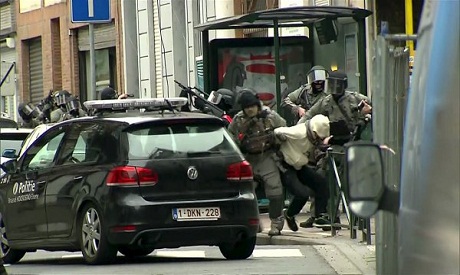
Armed Belgian police apprehend a suspect, in this still image taken from video, in Molenbeek, near Brussels, Belgium, March 18, 2016. (Photo: Reuters)
The lawyer to top Paris attacks fugitive Salah Abdeslam launched a furious legal fight Sunday to avoid extradition after Europe's most wanted fugitive spent his first night in a Belgian prison.
Abdeslam is held in a high security jail on charges of "terrorist murder" for his role in the November 13 gun and suicide attacks on the French capital, which killed 130 people.
The Belgian-born French citizen, who was caught unarmed after being shot in the leg during a Friday police raid in Brussels, told interrogators he had planned to blow himself up at the Stade de France stadium in Paris but had backed out at the last minute.
A day after his capture, the 26-year-old was taken to a maximum security prison in the northwestern city of Bruges where police are eager to question the man who is the only survivor of the 10-man commando believed to have carried out the attacks.
His lawyer Sven Mary said Abdeslam would fight his extradition to Paris beginning with a legal complaint against a French prosecutor who divulged the details of the first interrogation with the suspect to journalists on Saturday.
"I don't understand why a prosecutor in Paris has to communicate at this stage on an investigation in Belgium," Mary told Le Soir newspaper on Sunday.
Abdeslam "is worth gold. He is collaborating, he's communicating, he is not using his right to remain silent," Mary said, urging patience.
Paris prosector Francois Molins on Saturday told reporters Abdeslam had played a "central role" in planning the November attacks, which targeted bars, restaurants and the Bataclan concert hall and were claimed by the Islamic State group (IS).
His brother Brahim blew himself up in a restaurant in the east of the French capital, and Molins said Abdeslam had planned to do the same at the Stade de France before changing his mind.
Investigators believe Abdeslam rented rooms in the Paris area to be used by the attackers and a car, which he used to drive them to the Stade de France before heading to the 18th arrondissement in the north of the capital.
Days after the attacks an explosives-filled suicide vest was found in Paris in an area where mobile phone signals indicated Abdeslam had been.
Abdeslam was "directly linked to the preparation, the organisation and, unfortunately, the perpetration of these attacks," said Hollande, who was in Brussels for an EU summit when the raid took place.
French President Francois Hollande said shortly after his arrest Friday that he wanted to see Abdeslam transferred to France as quickly as possible to face prosecution.
Abdeslam's arrest in the gritty Molenbeek neighbourhood of Brussels was hailed by European and US leaders, while French Interior Minister Bernard Cazeneuve said it dealt a "major blow" to IS militants operating in Europe.
But the minister warned Saturday that the threat level remained "extremely high" and said France was deploying extra police officers to its borders to step up controls following discussions with Interpol.
Abdeslam is behind bars in solitary confinement at the Bruges high-security prison alongside Mehdi Nemmouche, who carried out a fatal attack on the Jewish Museum in Brussels in 2014.
Police have also detained a suspected accomplice, known only under the false IDs of Amine Choukri or Mounir Ahmed Alaaj, but at a prison near Liege in eastern Belgium.
Former small-time criminal Abdeslam is believed to be the last surviving member of the 10-man militant team that carried out the Paris attacks.
Two more suspects are wanted in connection with the killings -- Mohamed Abrini, who became friends with Abdeslam when they were teenagers, and another fugitive known only by a name used on false papers, Soufiane Kayal.
Prosecutors said special forces raided a house in Molenbeek on Friday because of evidence found in an operation elsewhere in Brussels on Tuesday, in which another Paris-linked suspect died in a gunbattle.
Abdeslam's fingerprints were found at the scene of the first raid.
The police on Friday were also convinced they were on the right trail by the unusual number of pizzas ordered by a resident of the Molenbeek house, Belgian media said.
Short link: